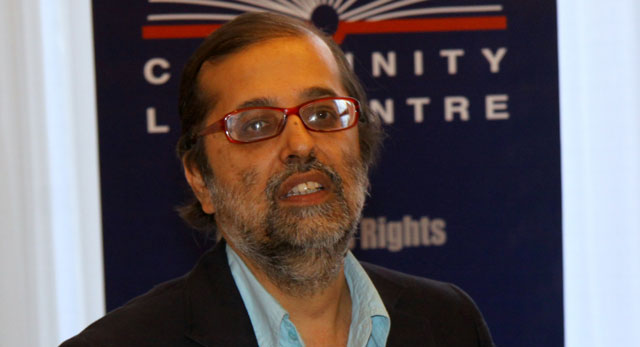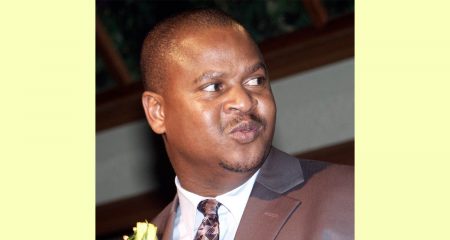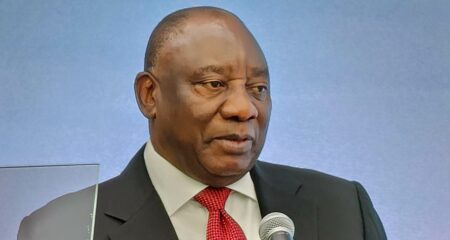
I know sections of the media and the IT industry have reservations about me. Ja, okay, the guy works hard and has been in politics for a while, but what does he really know about ICT, they say.
And, of course, the Democratic Alliance and others express concern that, as a South African Communist Party Politburo member, I’m going to go for nationalisation.
Well, I’ll tell you what: in the interests of openness and transparency — and, yes, government is capable of this – the moment the president appointed me, I broke into a heart-rending rendition of The Internationale.
And, of course, I immediately Googled Joseph Stalin for his views on broadband and digital terrestrial television and local-loop unbundling. You know what? Joe is cool about this, he’s all for it, except that he wasn’t sure about which type of set-top boxes were most ideologically sound. He can’t know everything, can he?
Stalin agrees with most of what the major stakeholders in the ICT sector say. Okay, I, err, don’t agree with the methods he insists on of how to get there (you know Stalin!), but please be assured he fully supports rapid transformation of the ICT sector.
Anyway, this thing about me being a communist and therefore bad for the ICT sector is, if you’ll excuse the pun, a red herring.
I agree that having studied journalism in 1977, which in the ICT world is some 5 000 years ago — and doing some freelance journalism and editing the erratic publications of the SACP — doesn’t quite qualify me to be minister of communications. But let me assure you that I can switch my cellphone on and SMS and use the Internet and do a lot of other things, too. And I’m very keen to learn more.
Even if my heart is still in local government, my mind and body and will are very much in communications now. Anyway, I have no choice. Working with others, I just have to do what’s necessary and urgent. And believe me, I mean to.
And you tell me: where in the advanced industrialised democracies do you have ministers of communications with PhDs in ICT? And why would it follow that if you have technical qualifications in the ICT sector you’d make a useful minister? Yes, it would help to have some technical qualification and expertise and experience, but it’s not a precondition for the post.
The minister of communications, in any case, doesn’t on their own determine ICT policies. They are shaped through collective engagement, including through cabinet as a whole. The minister’s role, as part of various collectives, is to define the goals and provide effective political and strategic oversight over the department, state-owned enterprises and other relevant structures to ensure that goals are achieved.
What’s more important than the technical qualifications of a politician is what he or she gets done and how. I’m a politician, not a technical expert, and an important measure of how useful I can be is the technical expertise and experience I draw on. If there’s one thing that’s really come across these past 16 days in my new post, it’s that we have a lot of expertise and experience in this sector that we are just not cohering and making effective use of.
I have received more than 70 requests for meetings from organisations and individuals through letters, SMSes and phone calls — and between deputy minister Stella Ndabeni-Abrahams, senior department officials and me, we will be meeting almost all, if not all, of them. We have also reached out to commentators who have written in the media about what they think we should do, and are arranging to meet them.
But there’s no populism here, let me stress. We can’t endlessly consult. The first round of consultations has drawn in the state-owned enterprises and other public entities, NGOs, community organisations and experts.
We will soon set our strategy and programme for the period until the 2014 elections as part of developing a five-year strategic framework for 2014-19 that the incoming executive will take forward.
Of course, consultations will continue, but there also has to action. Ultimately, as consensual as we may seek to be, government has to govern and the masses will have to judge us.
Where are we headed?
We will work within the frameworks provided in the national development plan (NDP), contested though parts of it are; the new growth path; the ANC’s Mangaung policy conference resolutions; and the relevant government ICT policies adopted since 1994.
Our overall strategy has six key aspects for now:
- We are working on greater unity and coherence in the department of communications, filling vacant posts and ensuring the department functions in a more consensual way with ICT stakeholders and is more sensitive to the needs of consumers.
- The ICT sector is too fragmented and fractious. Of course, there are the inevitable differences and competition, but there is enough common interest that serves us all for a more consensual and cooperative terrain to be forged.
- With the 2014 elections looming, we have about nine months left before the end of our term. We need to review the programme of the department and set realistic and realisable targets for the next nine months.
- But, importantly, we have to be strategic about what targets we choose for the nine months ahead. They can’t just be ad hoc. They need to create a much firmer foundation for the next five-year term, for faster ICT delivery and providing key elements of a 2014-2019 strategic framework.
- Finalising the ICT policy review, with a green paper within three months. Our programmes and activities should feed into and take into account the policy review.
- Locating the policy review and overall programme of the department within the national development plan, the new growth path and the Mangaung ICT policy framework.
As for our programme for the next nine months, what, for now, are the key elements?
- We have to sensibly and sensitively set a firm foundation for a further reduction in the costs of communication.
- We want to see broadband becoming more extensive, affordable and speedier. We intend finalising the national broadband policy and implementation programme within three months.
- The digital divide between the haves and have-nots needs to be reduced, and we are going to place much greater stress on delivering in rural and underserviced areas.
- The SABC and other state-owned companies and public entities in the ICT sector need to be made more stable and effective.
- The roll-out of digital television must begin before the end of this year.
Given the challenging terrain, limited time and lack of resources, we have to be realistic about what’s possible. There are no guarantees that all I’ve just said will get done. But what there is a guarantee of, is that there will be significant progress in getting there and there will be a much more consensual yet decisive approach to doing so.
And it’s not, let me stress, up to government alone to deliver. We all need to work together. We all need to play our part. Our important task as the ministry is to create the space for this. And that we will certainly do.
- Yunus Carrim is South Africa’s minister of communications
- This is a shortened version of a speech delivered to the National Editors’ Forum on 27 July




